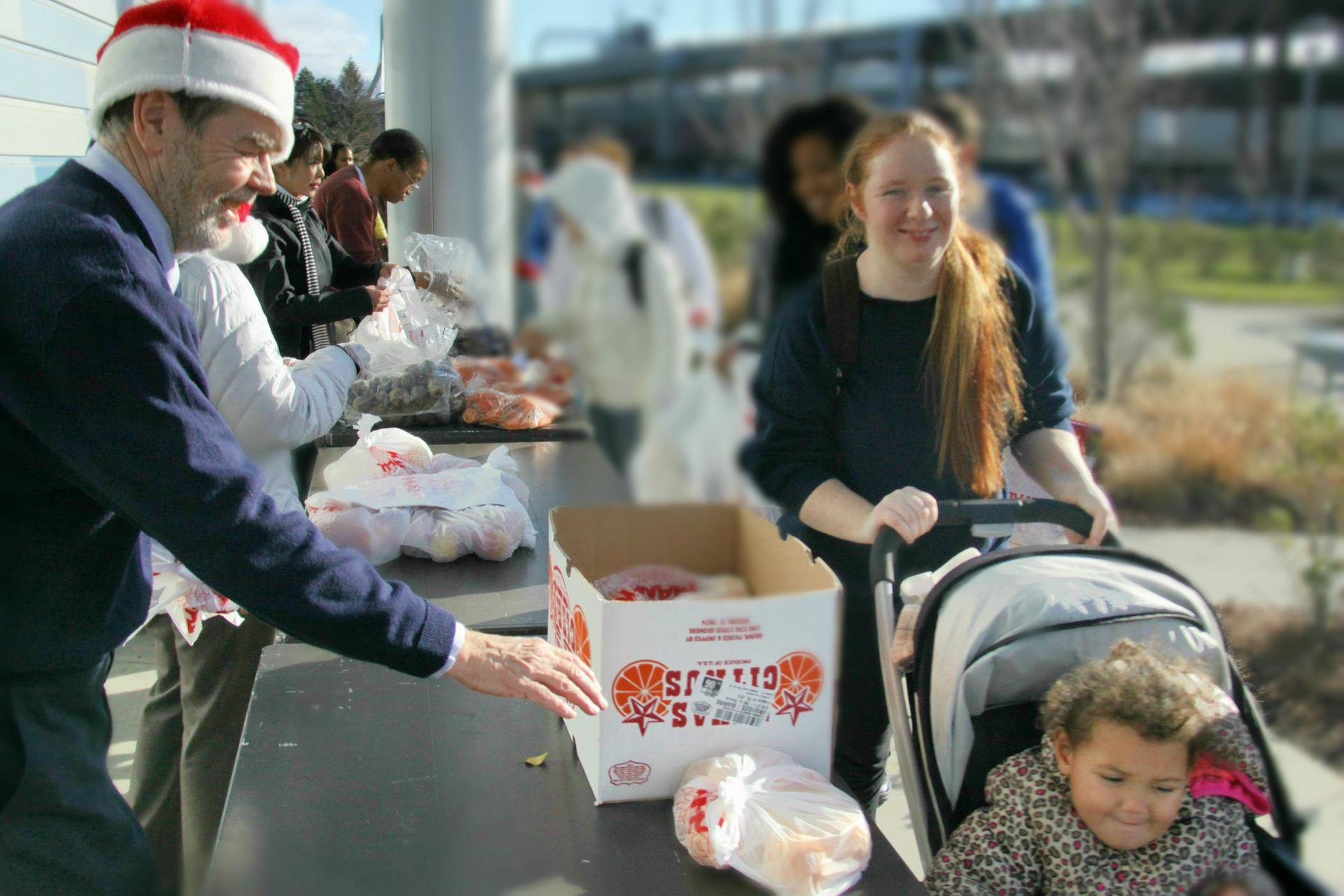Bunker Hill Community College student Meaghan McGarrell, 23, picks up groceries at the school’s monthly food pantry.
At Bunker Hill Community College in Boston, the line snakes around the gym and spills out onto the sidewalk. Nearly 200 students carry backpacks and roll baskets, hoping to fill them not with books, but with food.
This is one of hundreds of volunteer-run food pantries that have cropped up on college campuses across the country. The goal is to assist students in need this holiday season.
In the back of the line, 23-year-old Meaghan McGarrell of Hyde Park pushes her 2-year old daughter in a stroller, picking up oranges, onions, potatoes, and other foods.
McGarrell is a single mom. On top of tuition, fees and other expenses like health care and clothing, she struggles to pay her $1,400 rent each month. Occasionally, she and her daughter have to scrounge for food.
"Last week, they had a free frozen yogurt and I actually took her to get some frozen yogurt because frozen yogurt can be expensive and why not jump on that?" says McGarrell.
For students like McGarrell, this food bank has been essential, especially around the holidays.
"This is actually my second time doing it this semester and it’s helped so much. It will carry me through until next month, maybe even February. Especially the onions with her,” says McGarrell, pointing to her daughter. “She loves onions."
A new study by researchers at the University of Wisconsin's HOPE Lab finds McGarrell is not alone. One in five community college students are so poor that they can't afford to eat, and 80 percent of the total cost of a year in community college is books, transportation, health care and food.
In Massachusetts, 25 of the state's 28 public campuses assist students in need of food assistance — up from 19 last year.
“The campuses wouldn’t open these food pantries if there wasn’t a need,” says Massachusetts Higher Education Commissioner Carlos Santiago.
The state doesn’t have accurate numbers on exactly how many students need assistance, partly because many students are too ashamed to ask for help. But Santiago is convinced it's a growing problem.
“There’s a degree of stigma attached to it, but if you’ve got a family to feed you do it,” Santiago said.
This much Santiago does know: Hunger is not limited to community colleges.
"It's a systemwide issue. It impacts campuses across the three segments: community colleges, state universities and the UMass campuses are seeing it as well," he says.
Santiago speaks from experience. He knows firsthand what it's like to be a hungry student; while studying for his PhD at Cornell, he spent a lot of time thinking about where to get his next meal.
"I had a family and a one-year-old. I got a grant to go to the program. We were new to the area in Ithaca, New York, and we were eligible for food stamps," he says. "It got us through that first semester, and I recall of all the semesters I studied as a doctoral student, that was the one time where I turned to my wife and I said, 'Let's go home, because we can't make this work. And yet, the food stamp program was very helpful."
Since then, federal and state governments have reduced financial aid, and the cost of college has shifted to students and families.
Back at Bunker Hill Community College, student Diane McManus is collecting food ahead of Christmas. The 57-year-old mother of seven is studying culinary arts and she’s so hungry that sometimes she can’t focus on her studies.
"It’s heartbreaking, sometimes devastating, especially when you’re not just thinking of you but when you’re going to provide for the ones that you have. Sometimes you beat yourself up because you try to think back as to what did you do?" said McManus.
Between classes and work, McManus doesn't have the time or resources to go to the regular food bank, so she appreciates the extra assistance on campus.
"It’s very difficult — the finances. Even though the kids are grown up and gone, I have a mortgage, condo fee, light bill, gas bill," she says.
This story was produced by On Campus, a public radio reporting initiative focused on higher education produced in Boston at WGBH.
Our coverage reaches millions each week, but only a small fraction of listeners contribute to sustain our program. We still need 224 more people to donate $100 or $10/monthly to unlock our $67,000 match. Will you help us get there today?
